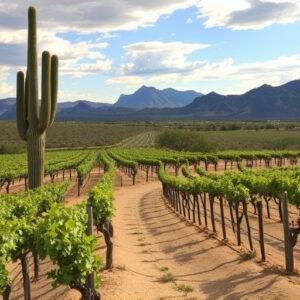Southern Arizona emerges as a hidden gem for wine lovers, boasting some of the country's most celebrated wineries. The region's unique viticulture, fueled by mineral-rich soils and abundant sunlight, produces renowned crisp white wines with distinct character. Winemakers employ innovative techniques to overcome the hot, dry climate, resulting in high-quality wines that set them apart. Southern Arizona's desert terroir supports sensitive grape varieties like Sauvignon Blanc, Riesling, and Chenin Blanc, known for their citrus, mineral, and floral flavors. Winemakers' sustainable practices promote ecological balance and ensure the long-term viability of viticulture.
“Uncover the enchanting world of Southern Arizona’s desert wine country, where crisp white wines bloom in mineral-rich soils. This arid landscape presents unique challenges for winemakers, yet it yields remarkable results. From exploring the region’s distinctive terroir to tasting varietals thriving in the heat, this article delves into the art and future sustainability of winemaking in these extraordinary conditions. Discover why Southern Arizona wineries are making waves globally.”
- Exploring Southern Arizona's Desert Wine Country
- The Unique Challenge and Reward of Growing Grapes in Arid Conditions
- Mineral-Rich Soils: A Winemaker's Dream or Nightmare?
- Varietals Thriving in the Desert Heat: A Taste Test
- Sustainable Practices and the Future of Southern Arizona Winemaking
Exploring Southern Arizona's Desert Wine Country
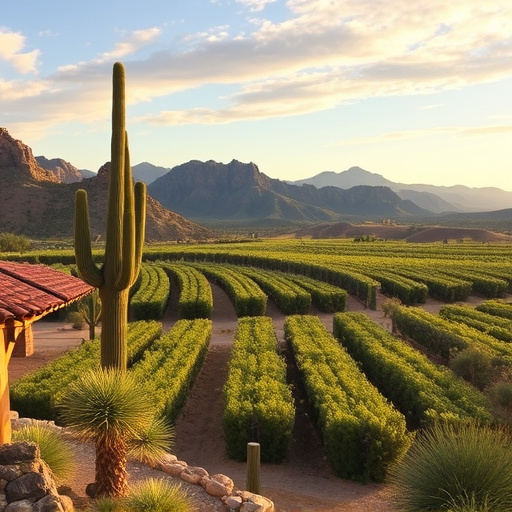
Southern Arizona, nestled within the Sonoran Desert, is a hidden gem for wine enthusiasts, boasting some of the most unique and renowned wineries in the country. This region’s desert wine country offers a captivating contrast between the arid landscape and the thriving viticulture that has taken root here. The mineral-rich soils, bathed in intense sunlight, create an ideal environment for cultivating crisp white grapes, known for their distinct character and flavor profiles.
Exploring these southern Arizona wineries, visitors are treated to not only exquisite wines but also breathtaking views. The region’s desert scenery, with its rugged mountains and vibrant wildflowers, provides a stunning backdrop for wine tastings and tours. Many of these wineries have embraced sustainable farming practices, allowing them to thrive in this challenging climate while preserving the natural beauty that surrounds them.
The Unique Challenge and Reward of Growing Grapes in Arid Conditions
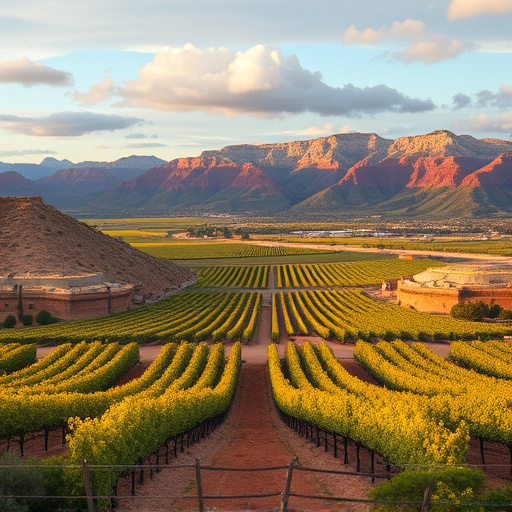
Growing grapes in arid conditions, like those found in Southern Arizona’s desert landscapes, presents a unique challenge for winemakers. The region’s hot, dry climate demands innovative techniques to ensure the vines receive adequate water and nutrients. Winery owners in this area often employ advanced irrigation systems, carefully timed drip methods, and soil amendments rich in minerals to support grape growth. This meticulous care results in distinctively flavored wines that capture the essence of their mineral-rich terroir.
Despite these challenges, the reward is remarkable—vines thrive in this harsh environment, producing crisp white grapes with intense flavors. Southern Arizona wineries have successfully harnessed the region’s unique characteristics, creating a range of exquisite white wines recognized for their vibrant acidity and complex mineral profiles. This ability to cultivate high-quality grapes in arid conditions sets these wineries apart, attracting wine enthusiasts who appreciate the distinct character of desert-grown vintages.
Mineral-Rich Soils: A Winemaker's Dream or Nightmare?
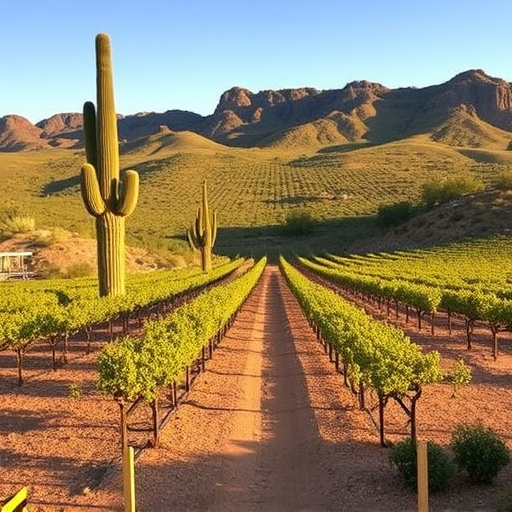
In the heart of southern Arizona, winemakers have discovered a unique opportunity in the region’s mineral-rich desert soils. These soil types, often overlooked, present both a dream and a challenge for viticulturists. The positive aspect is that minerals like iron, magnesium, and calcium can impart distinct flavors and aromas to the grapes, creating wines with complex profiles. Winemakers can craft crisp white wines with remarkable character by harnessing these soil benefits.
However, managing mineral-rich soils demands careful attention. High mineral content can lead to increased pH levels, affecting the acidity of the wine. Southern Arizona wineries must employ precise viticultural techniques, including specific grape varieties and tailored irrigation practices, to balance these attributes. This ensures that the unique terroir translates into high-quality wines while also providing a sustainable approach to desert viticulture.
Varietals Thriving in the Desert Heat: A Taste Test
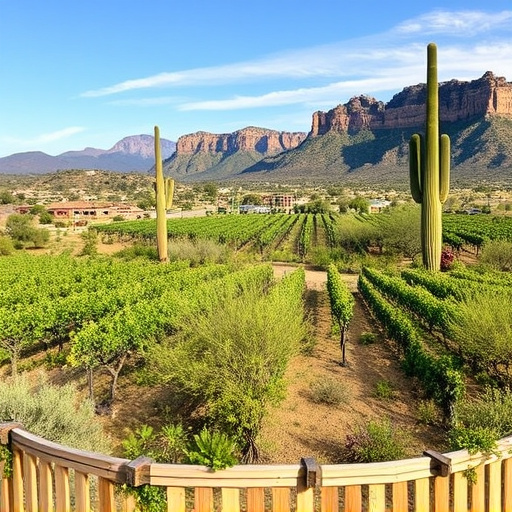
In the scorching heat of Southern Arizona, where desert winds sweep through vast expanses of mineral-rich soils, an unexpected ecosystem thrives—one that cultivates some of the most crisp and unique white wines in the region. This is the story of southern Arizona wineries and their ability to nurture varietals that would otherwise falter under such harsh conditions. The key lies in the soil—a blend of ancient rock and mineral deposits that provide a nutrient-rich foundation for grapes like Sauvignon Blanc, Riesling, and Chenin Blanc, varieties known for their sensitivity to heat.
These resilient grapes find their haven in the desert landscape, where they bask in the intense sunlight and absorb the earth’s minerals, resulting in wines with remarkable acidity and distinct flavor profiles. A taste test of these southern Arizona wines reveals a refreshing balance—the crispness cuts through any residual sweetness, offering a complex dance of citrus, mineral, and floral notes. This unique terroir, combined with the expertise of local winemakers, is revolutionizing the wine industry, proving that even in the most unexpected places, remarkable vintages can be born.
Sustainable Practices and the Future of Southern Arizona Winemaking
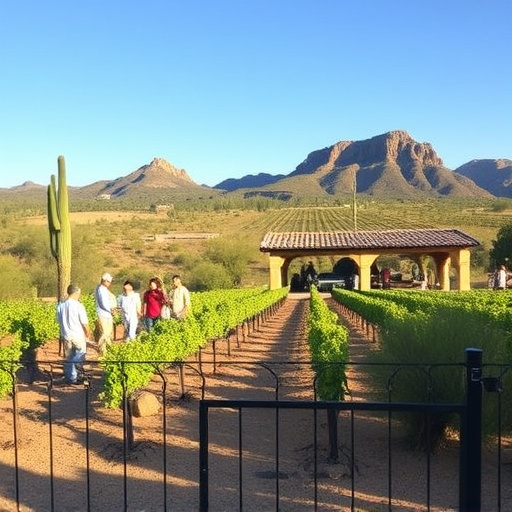
Southern Arizona, known for its arid climate and rugged landscapes, has emerged as a surprising hub for winemaking, particularly when it comes to crisp white wines crafted from grapes grown in mineral-rich desert soils. This region’s winemakers are not only showcasing exceptional quality but also embracing sustainable practices that could shape the future of the local industry. By implementing organic farming methods, reducing chemical usage, and utilizing natural resources efficiently, these pioneers are not only producing award-winning wines but also preserving the environment for future generations.
The commitment to sustainability in Southern Arizona wineries goes beyond individual farms; it’s a collective effort to promote ecological balance while ensuring the long-term viability of viticulture in this unique region. As climate change continues to impact global agriculture, these innovative winemakers are proving that adapting to challenging conditions can result in remarkable wines and a thriving, eco-conscious industry.
Southern Arizona’s desert vineyards represent a unique and sustainable approach to winemaking, where challenging conditions have fostered remarkable resilience in both grapes and winemakers. The mineral-rich soils, though initially daunting, offer a distinct flavor profile that has captivated palates worldwide. As practices continue to evolve, the future of Southern Arizona wineries looks bright, promising to enhance the region’s reputation as a premier destination for crisp white wines grown in arid environments.
